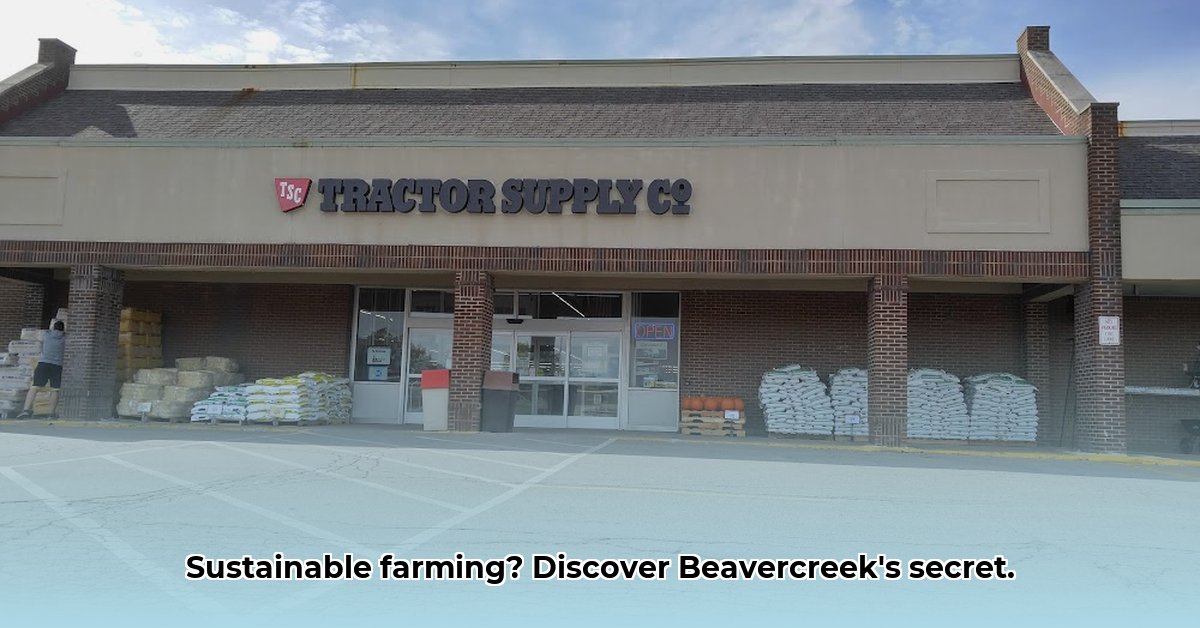
Tractor Supply Beavercreek: Current Offerings and Future Potential for Sustainable Agriculture
Tractor Supply Company (TSC) in Beavercreek, Ohio, serves a vital role in the local agricultural community, providing farmers with essential supplies. For examples of other TSC locations' sustainability efforts, see this example store. While the store offers a range of products that could support sustainable agricultural practices, a more focused effort is needed to maximize its impact and actively promote environmentally friendly solutions. This article explores TSC Beavercreek's current contributions to sustainable farming, identifies areas for improvement, and proposes actionable steps to enhance its role in creating a more resilient and environmentally responsible agricultural sector in the region.
Tractor Supply's Current Sustainable Agriculture Offerings
TSC Beavercreek currently stocks products potentially relevant to sustainable practices. This may include organic seeds, water-efficient irrigation equipment, and tools designed for minimal soil disruption. However, a comprehensive assessment of their sales data, specifically focusing on sales of these sustainable products compared to conventional alternatives, is lacking. Without this data, it's difficult to quantify TSC Beavercreek's actual contribution to sustainable agriculture in the region. Understanding the volume of organic seeds sold relative to conventional seeds, for instance, would provide crucial insights into consumer demand and market penetration. Further research is needed to fully evaluate the store's effectiveness in supporting sustainable farming.
Opportunities for Improvement: Actionable Steps for TSC Beavercreek
To significantly enhance its contribution to sustainable agriculture, TSC Beavercreek should prioritize several key improvements. These are not merely suggestions but concrete steps that can translate into measurable positive environmental impact:
Enhanced Product Promotion and Visibility: Creating dedicated displays and using prominent signage to highlight sustainable products is crucial. This should include clear and concise labeling that educates consumers about the environmental benefits of choosing these options. A well-organized section dedicated to sustainable options will attract consumers actively seeking eco-friendly products.
Comprehensive Staff Training: Investing in staff training programs focused on sustainable agriculture practices is paramount. Employees should be equipped with the knowledge to effectively help customers choose eco-friendly products and answer their questions about sustainable farming techniques. This will enhance the store's ability to act as a trusted resource for the local farming community.
Strategic Community Partnerships: Collaborating with local farmers, agricultural organizations (such as the Ohio State University Extension), and environmental groups can expand TSC's reach and amplify its message. Joint workshops, educational programs, and even pilot projects focused on sustainable farming techniques could generate significant positive impact throughout the community. These collaborations can also foster mutual learning and provide TSC with valuable insights into the practical needs and challenges faced by local farmers.
The Benefits of Sustainable Agriculture: A Community-Wide Impact
Adopting sustainable farming practices delivers a multitude of benefits that extend far beyond the individual farm. These practices improve soil health, leading to increased crop yields and healthier plants. Reducing reliance on chemical fertilizers and pesticides safeguards water resources and improves air quality—a benefit extending to the entire community. The transition to sustainable agriculture also strengthens resilience to climate change by enhancing the adaptability of farming systems to fluctuating weather conditions.
Addressing Challenges: Consumer Demand, Product Availability, and Cost
Despite the numerous benefits, several obstacles hinder the widespread adoption of sustainable agriculture. Consumer demand remains a key factor. While awareness of sustainable agriculture is growing, it doesn't always translate into consistent purchasing decisions. Moreover, the upfront cost of sustainable materials or practices can be higher, creating a barrier for some farmers and consumers. Finally, the availability of sustainable products, particularly those specifically tailored to the region, is sometimes limited. Addressing these challenges necessitates a multi-faceted approach that includes consumer education, highlighting the long-term cost-effectiveness of sustainable solutions, and working to increase the affordability and availability of eco-friendly products in the local area.
A Call to Action: Cultivating a Sustainable Future Together
The transition to a more sustainable agricultural future in the Beavercreek area requires a joint commitment from TSC Beavercreek, local farmers, consumers, and the wider community. Supporting local businesses actively promoting sustainable products is critical. We can also encourage and advocate for policies that support sustainable agricultural practices and urge TSC to expand its range of sustainable products and invest in ongoing staff training initiatives. This concerted effort is essential to building a more resilient and prosperous agricultural sector while protecting our environment, and it starts with each of us.
Further Research: Data-Driven Insights for Sustainable Growth
To thoroughly understand the contribution of TSC Beavercreek to sustainable agriculture, rigorous data collection is needed. This includes detailed sales figures comparing the volume of sustainable products sold relative to conventional counterparts, providing a precise measure of TCS's impact on the region. Conducting farmer surveys and gathering insights into consumer needs and preferences are vital components of the research process. Ongoing data collection and analysis are essential to shaping effective strategies to enhance TSC's support of a more sustainable and successful agricultural landscape.